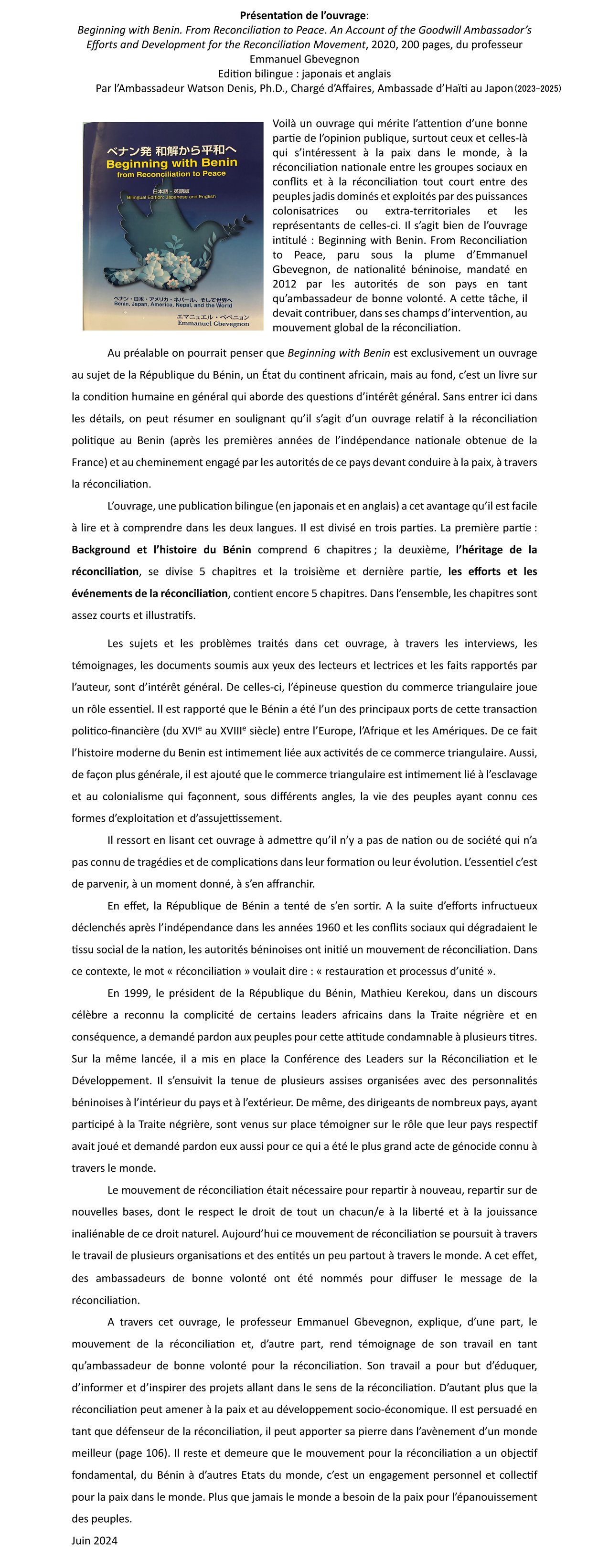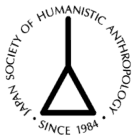Presentation of the book :
Beginning with Benin. From Reconciliation to Peace . An Account of the Goodwill Ambassador’s Efforts and Development for the Reconciliation Movement , 2020, 200 pages, by Professor Emmanuel Gbevegnon
Bilingual edition: Japanese and English
By Ambassador Watson Denis, Ph.D. Chargé d’Affaires, Embassy of Haiti in Japan(2023-2025)

This is a work which deserves the attention of a large portion of the public, especially those who are interested in peace, in national reconciliation between social groups in conflict and reconciliation between peoples formerly dominated and exploited by colonizing powers and their representatives. This is the book entitled: Beginning with Benin. From Reconciliation to Peace, published by Emmanuel Gbevegnon, a national from Benin, mandated in 2012 by the authorities of his country as a goodwill ambassador with a specific mandate to contributing, in his social and political networks, to the global
Some people might think that Beginning with Benin is exclusively a book about the Republic of Benin, a state on the African continent, but in fact it is a book about the human condition that can be of interest to everyone. Without going into details here, we can summarize by pointing out that it is a publication relating to political reconciliation in Benin (after the first years of national independence obtained from France) and the journey undertaken by the authorities of this country to lead to peace, through reconciliation. In this regard, peace and reconciliation are topics of interest for all.
The book, a bilingual publication (in Japanese and English) has the advantage that it is easy to read and understand in both languages. It is divided into three parts. The first part: Background and history of Benin includes 6 chapters; the second, the legacy of reconciliation, is divided into 5 chapters and the third and final part, the efforts and events of reconciliation, contains another 5 chapters. Overall, the chapters are quite short and illustrative.
The subjects and problems considered in this work, through interviews, testimonies, documents, and the facts reported by the author, are of general interest. Of these, the thorny issue of Atlantic Slave Trade plays an essential role. It is reported that Benin was one of the main ports of this political-financial transaction (from the 16th to the 18th century) between Europe, Africa and the Americas. As a result, the modern history of Benin is closely linked to the activities of
the Atlantic Slave Trade. Also, more generally, it is intimately linked to slavery and colonialism which shape, from different angles, the lives of people who have experienced these forms of exploitation and subjugation.
Reading this book, it becomes clear to understand that there is no nation or society that has not experienced tragedies and complications in their formation or evolution. The main challenge is to manage, at a given moment, to get the appropriate solution from the difficulties.
Indeed, the Republic of Benin tried to get out of them. Following unsuccessful efforts launched after independence in the 1960s and the social conflicts which degraded the social fabric of the nation, the Beninese authorities initiated a reconciliation movement. In this context, the word «reconciliation» meant: «restoration and process of unity».
In 1999, the President of the Republic of Benin, Mathieu Kerekou, in a famous speech recognized the complicity of certain African leaders in the Atlantic Slave Trade and consequently, asked forgiveness those who had reprehensible attitudes on several grounds. Following this memorable speech, he set up the Conference of Leaders on Reconciliation and Development. This followed the holding of several meetings organized with Beninese personalities inside and outside of the country. Likewise, leaders of many countries, having participated in the Atlantic Slave Trade, came to testify on the role that their respective countries had played and also asked for forgiveness for what was the greatest act of genocide in the history of humankind.
The reconciliation movement was necessary to start anew, to begin on new bases, including respect for the right of everyone to freedom and the inalienable enjoyment of this natural right. Today this reconciliation movement continues through the work of several organizations and entities all over the world. To this end, goodwill ambassadors have been appointed to spread the message of reconciliation.
Through this work, Professor Emmanuel Gbevegnon explains, on the one hand, the reconciliation movement and, on the other hand, gives testimony to his work as a goodwill ambassador for reconciliation. Its work aims to educate, inform, and inspire projects on reconciliation. Especially since reconciliation can lead to peace and socio-economic development. He is convinced, as a defender of reconciliation, he can make his contribution to the advent of a better world (page 106). It remains that the movement for reconciliation has a fundamental objective, from Benin to other States, it is a personal and collective commitment for peace in the world. More than ever, the world needs peace for the development of the peoples.
June 2024


À propos du Dr Watson R. Denis >>
ワトソン・デニス博士(駐日ハイチ大使館公使参事官・臨時代理大使[2023-2025]、歴史家、研究者)による書籍「Beginning with Benin」のプレゼンテーション
これは、平和、紛争中の社会集団間の国家和解、かつて植民地支配国とその代表者によって支配され搾取されていた民族間の和解に関心のある大勢の人々の注目に値する作品です。「Beginning with Benin 和解から平和へ」と題された本で、ベナン出身のエマニュエル・ベベニョン氏が出版しました。ベベニョン氏はベナン共和国の当局から2012年に親善大使に任命され、社会的、政治的ネットワークを通じて世界に貢献するという特別な使命を帯びています。
「Beginning with Benin」は、アフリカ大陸の国であるベナン共和国についての本だとばかり思う人もいるかもしれませんが、実際には誰にとっても興味深い人間の状態に関する本です。ここでは詳細に立ち入ることはしませんが、要約すると、これはベナンの政治的和解(フランスから独立した最初の数年後)と、和解を通じて平和に導くためにこの国の当局が行った道のりに関する出版物であるということです。この点で、平和と和解はすべての人の関心事です。
この本はバイリンガル(日本語と英語)で出版されており、どちらの言語でも読みやすく理解しやすいという利点があります。この本は3つの部分に分かれています。第1部「ベナンの背景と歴史」には6章が含まれています。第2部「和解の遺産」は5章に分かれており、第3部と最終部「和解への歩みとその活動」にはさらに5章が含まれています。全体として、各章は非常に短く、説明的な内容になっています。
インタビュー、証言、文書、そして著者が報告した事実を通して、本書で考察された主題と問題は、一般的な関心事であります。その中でも、大西洋奴隷貿易といういばらの問題が重要な役割を果たしています。ベナンは16世紀から18世紀にかけて、ヨーロッパ、アフリカ、アメリカ大陸を結ぶこの政治的・経済的取引の主要港のひとつであったと報告されています。その結果、ベナンの近代史は、大西洋奴隷貿易の活動と密接に結びついています。また、より一般的には、奴隷制と植民地主義と密接に結びついており、このような搾取と服従の形態を経験した人々の生活を、さまざまな角度から形作っています。
この本を読むと、国家や社会が形成されたり進化したりする過程で、悲劇や複雑な事態を経験していない国や社会など存在しないことがはっきりと分かります。主な課題は、与えられた瞬間に困難から適切な解決策を導き出すことです。
実際、ベナン共和国はそこから抜け出そうとしました。1960年代の独立後、社会的対立が国の社会構造を悪化させたため、ベナン当局は和解運動を開始しました。この文脈では、「和解」という言葉は「結束の修復とプロセス」を意味していました。
1999年、ベナン共和国の大統領マチュー・ケレクは有名な演説で、大西洋奴隷貿易における一部のアフリカの指導者の共謀を認め、その結果、いくつかの理由で非難されるべき態度を示した人々に赦しを請いました。この記憶に残る演説の後、彼は和解と開発に関する指導者会議を設立しました。これに続いて、国内外でベナンの著名人を集めた会合が数回開催されました。同様に、大西洋奴隷貿易に参加した多くの国の指導者が、それぞれの国が果たした役割について証言し、人類史上最大の大量虐殺行為に対する赦しを求めました。
和解運動は、自由に対するすべての人の権利の尊重と、この自然権の不可侵の享受を含む、新たな基盤の上に新たに出発するために必要なものでした。今日、この和解運動は、世界中のいくつかの組織や団体の活動を通じて継続しています。この目的のために、和解のメッセージを広めるために親善大使が任命されました。
この活動を通じて、エマニュエル・ベベニョン教授は、一方では和解運動を説明し、他方では和解の親善大使としての自身の活動について証言しています。その活動は、和解に関するプロジェクトを教育し、情報を提供し、鼓舞することを目的としています。特に和解は平和と社会経済の発展につながる可能性があるからです。彼は和解の擁護者として、より良い世界の到来に貢献できると確信しています(106ページ)。和解運動には、ベナンから他の国々に至るまで、世界平和のための個人的かつ集団的な取り組みという基本的な目的があることに変わりはありません。これまで以上に、世界は人々の発展のために平和を必要としています。
2024年6月 (和訳 2024年7月)
和訳読み上げ音声


